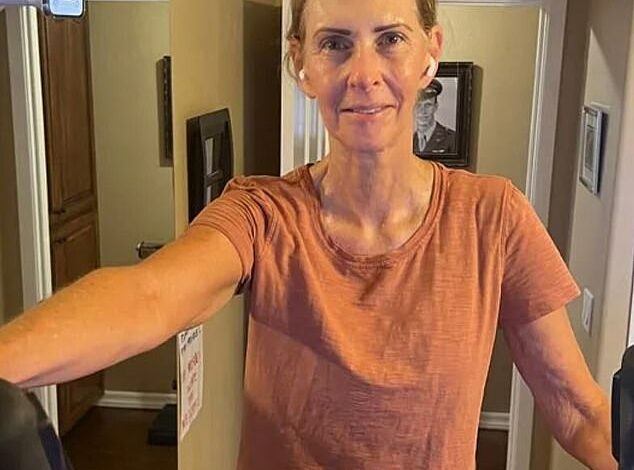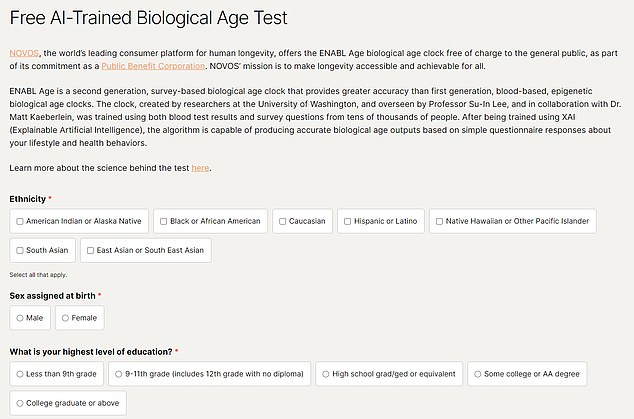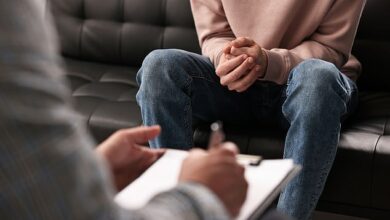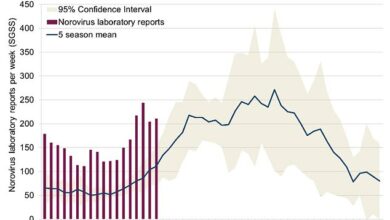The 24-Question Quiz That Reveals Your REAL Biological Age — and Your Risk of Disease



Scientists have developed an online calculator that allows you to see how old your body really is.
Longevity experts in New York City created the AI-powered tool that estimates a person’s biological age using 24 questions. All you need is an active email address.
Biological age differs from chronological age because it looks at the age of your cells and not the number of birthdays you have had.
The older cells are, the more wear and tear they show, putting people at greater risk of chronic diseases such as cancer.

Amy Hardison, 64, was surprised to find out she’s ranked fourth in the Rejuvenation Olympics, a competition for health fanatics, ahead of billionaires like Bryan Johnson
According to experts, a good result is a biological age that is slightly younger than the chronological age, or the number of years a person has lived.
But a biological age that matches chronological age is also considered a good sign.
However, in cases where the biological age is higher, experts warn that this may indicate a higher risk of heart disease, diabetes and death at a younger age.
The test also asks users for their arm circumference. If this is unknown, they can enter the US average of 13 inches.
There is also a question about blood pressure, where users are advised to facts from the American Heart Association to estimate their values in cases where they do not know.
A healthy range is 120/80 mmHg, while an unhealthy range is 120 to 129 and less than 80.

Above is a screenshot of the test, which estimates biological age through 24 questions
Usually, an expensive blood test is the only way to accurately determine how old someone’s cells are.
But the new test is free, no needles are used and it is based on the results of 47,000 Americans and Europeans.
People taking the test first answer questions about their ethnicity, gender, education level and income.
They are then asked questions about their lifestyle, including their weight gain over the past few years, their alcohol consumption and whether they get out of breath when climbing stairs.
The tool, developed by the NOVOS company, which deals with lifespan analysis, analyzes the data to determine a biological age. This age is sent to users via email.
It’s also possible to take the quiz in the company’s app, which will provide recommendations on how to improve your age — such as cutting back on coffee consumption or setting a consistent bedtime. You can access the test on the app here.
Chris Mirabile, founder of NOVOS, says they developed the tool to make biological age estimation more accessible to everyone.
“The longevity movement has gained a following among enthusiasts, but the real, day-to-day practice of it remains too secret,” he said.
“We want to give people free tools they can use to live longer, healthier lives. Everyone deserves to know their biological age and how certain lifestyle changes can slow it down.”
The test is based on a biological clock developed by longevity experts Dr. Su-In Lee and Dr. Matt Kaeberlein of the University of Washington.
Dr. Kaeberlein was the first scientist to suggest that resveratrol, a compound found in red wine, could reduce a person’s biological age, after studies with worms.
This research was later continued by Dr. David Sinclair, a longevity researcher at Harvard University, although clinical trials have not yet definitively shown that the substance can slow aging.
One of the people who managed to reduce their biological age after discovering their biological age was 64-year-old grandmother of 11, Amy Hardison of Mesa, Arizona.
The author and motivational speaker has been doing an hour of aerobic exercise every day for fifty years, lifting weights, stretching, and never taking supplements until she recently started NOVOS Core.
But despite this, she finished fourth at the Rejuvenation Olympics, a competition for health-obsessed people, beating billionaire Bryan Johnson.
According to her epigenetic test, she is currently aging at a rate of 0.74 years per chronological year, which is well below average.
She revealed her reaction to the results, saying: The times: ‘I just had to laugh. It was kind of ironic that I did it at all, because I’ve never been into taking vitamins and supplements.’




